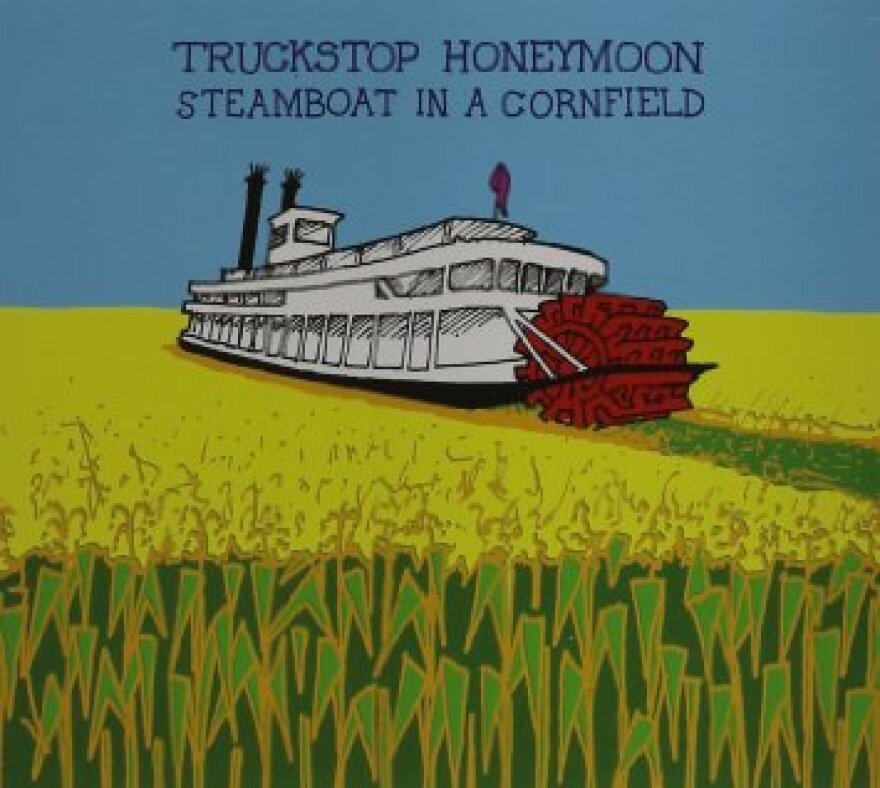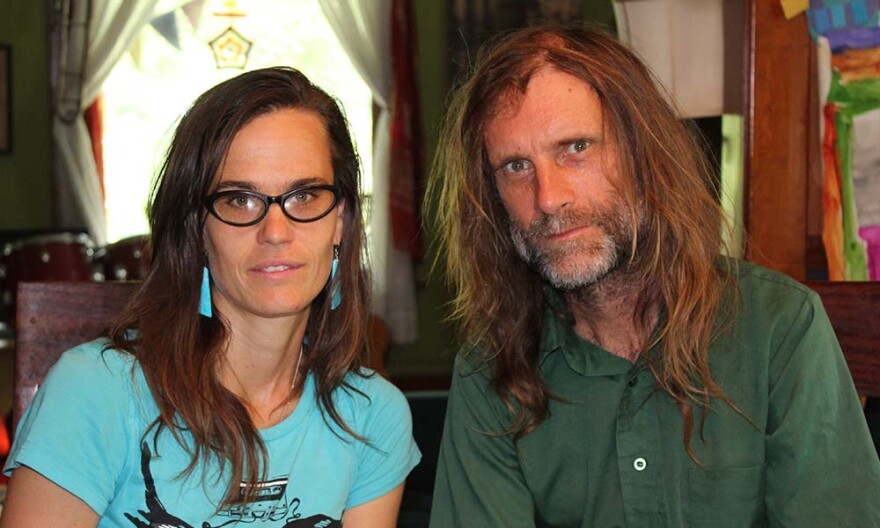Ten years ago this month, Hurricane Katrina decimated New Orleans and upended the lives of people who called the city home.
Mike and Katie West lived in the Lower Ninth Ward, and in the time since the hurricane, they have relocated to Lawrence, Kansas.
Mike West is sitting barefoot on his porch on a recent Thursday, leaning back against the railing; a guitar rests in his lap. The front door is open, and sunlight washes over the aged wood floors.
His wife Katie is in the kitchen, hurriedly making herself breakfast. Stepping inside, it’s immediately clear that this family is nourished by art, by self-expression, and by constant movement. Mike and Katie, along with their four kids and dog, spend a large portion of their time on tour as the two-piece band Truckstop Honeymoon.

The family seems to fit in here in Lawrence, with its hip vibe and a cultural richness less common on other Kansas towns.
“We love Lawrence," Mike says. "It’s a great town and we love the people in Kansas. … We just feel lucky that we found it, because it was by accident. We didn’t do any research. We could have ended up anywhere.”
That accident was Hurricane Katrina. The Wests lived in the New Orleans neighborhood known as the Lower Ninth Ward, an area cut off from the rest of the city by a shipping channel, the Industrial Canal. It was the last neighborhood to have services restored, and the last to dry out.

When the hurricane hit, the family was in Florida for a weekend of gigs, so they were safe from the storm. But their home wasn’t.
"When we went back to the house like two months after...they didn’t even let us go," Mike says, adding that he "had to forge a press pass" to get back into his own house.
He says the city was bone dry, and it had been for a month and a half. It was totally empty apart from Chicago firemen and the National Guard.
“It was curfew and there was nobody. Can you imagine like walking through Kansas City and there being nobody there?” Mike says.
He says at that time the Lower Ninth Ward was the only neighborhood that still was blocked off by the National Guard. No one was allowed through--except, according to Mike and his press pass, reporters.
He arrived to find their piano had turned into a ball of mold.
“It was outside," Mike says. "If you can imagine a grand piano just fuzzy and furry.”
Katie remembers "weird stuff" floating outside the house.
"I remember walking up and looking down and finding like some tiger balm to rub your muscles in the front yard," she says. "Oh, great, I was feeling a little tense!”
Luckily, they had a tour booked overseas for the next few months. They traveled and performed and found comfort in being uncomfortable. But they still had to deal with what was left of their home in New Orleans.


“Our neighborhood wasn’t livable for two years. Nobody lived there. It was empty," Mike says. "New Orleans had people coming back, but our neighborhood across that canal was empty...I think it took me and Katie a year and half to start trying to fix the house we had down there. And we were the first ones.”
The damage was worst on streets near the floodwall breach. Katie says their neighborhood was gone, its remnants a pile of houses that had washed into each other, smashed and flattened.
"[There were] some cars on top of that and the steeple of the church like a toothpick through the olive on a sandwich or something," she says. "Everything upside down. And the numbers and stuff spray-painted with the numbers of the dead people, they were still on our neighbors’ houses. It was gruesome."
Mike and Katie say their neighborhood was slow to recover because it was one of the poorest. Now, though, the area is becoming the “new” New Orleans, and Mike and Katie say their beloved former neighborhood, which they admit was dangerous and intimidating and not the best place to raise a family, is out of their price range.
“So you’ve got the gentrification conversation that just is the only thing anybody’s talking about when you’re down there," Katie says. "For anybody that’s been there from before that’s there now, it’s just overwhelming. Overwhelming.”
Related: Truckstop Honeymoon Takes Mardi Gras To Kansas
She says that on trips back to New Orleans, they see people having to recreate lifestyles in different places, pushed out by the money and new people coming in to the city.
"That always been the case, but it’s interesting to see it in a cycle because it was a really golden era when we were there, I felt. Before the flood happened. It was just pure magic," she says.
"But it’s still great. …God, that city. She’s a tired old whore, but she’ll still keep putting out."
You miss who you were, because that's gone, you know. That's the achingly sad part.
And while the couple clearly has a deep connection with The Big Easy, they say Lawrence has slowly started to feel like home.
“It's like a breakup or leaving a lover. You don't look for that lover again in other people. That’s a road to disaster. You have to move on, and if that's over, that's over," Mike says. "The bulk of it is, you miss who you were, because that's gone, you know. That’s the achingly sad part.
"And once you know that, you're like, 'Oh, that's fine.' You take any new experience with what it has to offer. That's why we can't compare Lawrence to New Orleans, but we can say this town has so many strengths and virtues of its own that are peculiar to it, and we've really enjoyed and we're very proud of it."
--
To contact KMUW News or to send in a news tip, reach us at news@kmuw.org.
Follow Abigail Wilson on Twitter @AbigailKMUW


